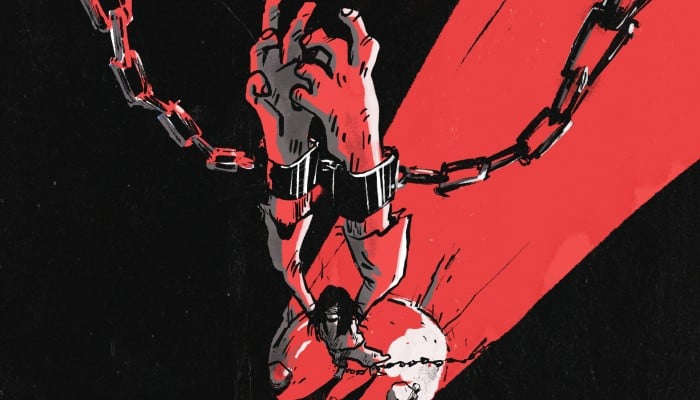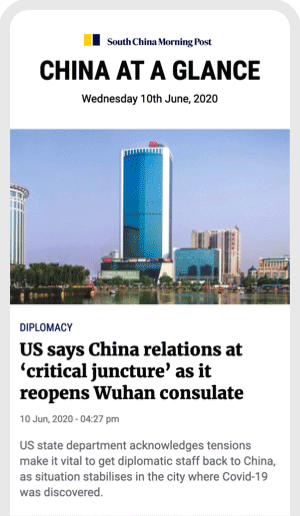Dear Global Impact Readers,
International Women’s Day on March 8 every year celebrates the cultural, political and socio-economic achievements of women, while also renewing the call to action for greater gender equality.
This year, the SCMP marked the occasion by joining UN Women’s Media Compact, a global alliance of media outlets committed to scaling up focus on women’s rights and gender equality. We also celebrated women trailblazers and encouraged discussion on how to shape a more equal future through our annual Women of Our Time conference.
But we must not forget that we are still a long way away from achieving true gender equality.
In this issue, Melissa Zhu, an assistant news editor with the China desk at the SCMP who is also the project lead for Lunar, our women’s readership initiative, takes a closer look at key issues that women in Asia and around the world continue to face.
Andrew Mullen
Production Editor, Political EconomyGender equality still a struggle, especially in crisis situations
The past year has seen women take great strides towards advancing gender equality: we saw China’s first female astronaut walk in space, the first trans woman win a Golden Globe and the first black woman set to become a US Supreme Court justice, just to name a few inspirational examples.
In mainland China, women have more financial power than before. They made up half of all homeowners last year and a larger proportion of chief executives and chief financial officers than the global average.
Yet, the trafficking of women and girls is still a major problem – a decades-old issue brought into the spotlight recently by a video of a mentally-ill woman chained in a dirty shack by a man who, as it turns out, had bought her as a bride from human traffickers.
Women and girls have also been disproportionately impacted by the Covid-19 pandemic. They are often the first to be laid off by employers, are more susceptible to the effects of “long Covid” symptoms and bear most of the burden of unpaid care work, which has become ever heavier as more people study and work from home.
As the crisis continues to batter economies around the world, more children are being forced into marriage, domestic and sexual violence against women is on the rise and expectant mothers are experiencing delays in treatment that in some tragic cases, have resulted in them suffering miscarriages.
Meanwhile, women with unwanted pregnancies have been unable to seek safe reproductive healthcare while confined to their homes, leaving some with no choice but to resort to risky home remedies.
The impact is especially devastating for women from groups that are vulnerable in other ways, such as domestic helpers. One Filipino woman in Hong Kong, forced to self-isolate in a car in frigid temperatures after she tested positive for Covid-19, did not dare to seek help for fear that her employer would terminate her contract.War and conflict has also led to further oppression of women in some countries. Most of the 10 million refugees that have fled their homes in Ukraine after Russia invaded are women and children, putting them at risk of human trafficking and exploitation.
In Afghanistan, girls and women have been prevented from working and attending school since the Taliban took over in August.
Women’s rights have diminished in Myanmar as well since a military coup last year, according to The Fuller Project, with some reportedly verbally and sexually harassed by the military while crossing checkpoints to go to work.
There is no simple solution to the complicated problems caused by gender inequality. But one thing that can and should be done is to ensure there are more women in top leadership and policymaking positions.
UN Women’s deputy regional director, Sarah Knibbs, has argued that in tackling climate change, which affects mostly women in agricultural work and other jobs dependent on natural resources, involving women in decision-making would be beneficial.
In doing so, “different perspectives are brought to bear, and we know that we are more likely to have decisions that positively impact a broader group of people in society,” she said.
- South China Morning Post, SCMP -
Dear Global Impact Readers,
International Women’s Day on March 8 every year celebrates the cultural, political and socio-economic achievements of women, while also renewing the call to action for greater gender equality.
This year, the SCMP marked the occasion by joining UN Women’s Media Compact, a global alliance of media outlets committed to scaling up focus on women’s rights and gender equality. We also celebrated women trailblazers and encouraged discussion on how to shape a more equal future through our annual Women of Our Time conference.
But we must not forget that we are still a long way away from achieving true gender equality.
In this issue, Melissa Zhu, an assistant news editor with the China desk at the SCMP who is also the project lead for Lunar, our women’s readership initiative, takes a closer look at key issues that women in Asia and around the world continue to face.
Andrew Mullen
Production Editor, Political EconomyGender equality still a struggle, especially in crisis situations
The past year has seen women take great strides towards advancing gender equality: we saw China’s first female astronaut walk in space, the first trans woman win a Golden Globe and the first black woman set to become a US Supreme Court justice, just to name a few inspirational examples.
In mainland China, women have more financial power than before. They made up half of all homeowners last year and a larger proportion of chief executives and chief financial officers than the global average.
Yet, the trafficking of women and girls is still a major problem – a decades-old issue brought into the spotlight recently by a video of a mentally-ill woman chained in a dirty shack by a man who, as it turns out, had bought her as a bride from human traffickers.
Women and girls have also been disproportionately impacted by the Covid-19 pandemic. They are often the first to be laid off by employers, are more susceptible to the effects of “long Covid” symptoms and bear most of the burden of unpaid care work, which has become ever heavier as more people study and work from home.
As the crisis continues to batter economies around the world, more children are being forced into marriage, domestic and sexual violence against women is on the rise and expectant mothers are experiencing delays in treatment that in some tragic cases, have resulted in them suffering miscarriages.
Meanwhile, women with unwanted pregnancies have been unable to seek safe reproductive healthcare while confined to their homes, leaving some with no choice but to resort to risky home remedies.
The impact is especially devastating for women from groups that are vulnerable in other ways, such as domestic helpers. One Filipino woman in Hong Kong, forced to self-isolate in a car in frigid temperatures after she tested positive for Covid-19, did not dare to seek help for fear that her employer would terminate her contract.War and conflict has also led to further oppression of women in some countries. Most of the 10 million refugees that have fled their homes in Ukraine after Russia invaded are women and children, putting them at risk of human trafficking and exploitation.
In Afghanistan, girls and women have been prevented from working and attending school since the Taliban took over in August.
Women’s rights have diminished in Myanmar as well since a military coup last year, according to The Fuller Project, with some reportedly verbally and sexually harassed by the military while crossing checkpoints to go to work.
There is no simple solution to the complicated problems caused by gender inequality. But one thing that can and should be done is to ensure there are more women in top leadership and policymaking positions.
UN Women’s deputy regional director, Sarah Knibbs, has argued that in tackling climate change, which affects mostly women in agricultural work and other jobs dependent on natural resources, involving women in decision-making would be beneficial.
In doing so, “different perspectives are brought to bear, and we know that we are more likely to have decisions that positively impact a broader group of people in society,” she said.
|
Was this newsletter forwarded to you? Subscribe here
|

|
|
|
|
|
26 March 2022 |
|
Welcome to our 2,077 newly joined SCMP Global Impact readers who signed up in the past week.
|
|
Dear Global Impact Readers,
International Women’s Day on March 8 every year celebrates the cultural, political and socio-economic achievements of women, while also renewing the call to action for greater gender equality.
This year, the SCMP marked the occasion by joining UN Women’s Media Compact, a global alliance of media outlets committed to scaling up focus on women’s rights and gender equality. We also celebrated women trailblazers and encouraged discussion on how to shape a more equal future through our annual Women of Our Time conference.
But we must not forget that we are still a long way away from achieving true gender equality.
In this issue, Melissa Zhu, an assistant news editor with the China desk at the SCMP who is also the project lead for Lunar, our women’s readership initiative, takes a closer look at key issues that women in Asia and around the world continue to face.
Andrew Mullen
Production Editor, Political Economy
Gender equality still a struggle, especially in crisis situations
The past year has seen women take great strides towards advancing gender equality: we saw China’s first female astronaut walk in space, the first trans woman win a Golden Globe and the first black woman set to become a US Supreme Court justice, just to name a few inspirational examples.
In mainland China, women have more financial power than before. They made up half of all homeowners last year and a larger proportion of chief executives and chief financial officers than the global average.
Yet, the trafficking of women and girls is still a major problem – a decades-old issue brought into the spotlight recently by a video of a mentally-ill woman chained in a dirty shack by a man who, as it turns out, had bought her as a bride from human traffickers.
Women and girls have also been disproportionately impacted by the Covid-19 pandemic. They are often the first to be laid off by employers, are more susceptible to the effects of “long Covid” symptoms and bear most of the burden of unpaid care work, which has become ever heavier as more people study and work from home.
As the crisis continues to batter economies around the world, more children are being forced into marriage, domestic and sexual violence against women is on the rise and expectant mothers are experiencing delays in treatment that in some tragic cases, have resulted in them suffering miscarriages.
Meanwhile, women with unwanted pregnancies have been unable to seek safe reproductive healthcare while confined to their homes, leaving some with no choice but to resort to risky home remedies.
The impact is especially devastating for women from groups that are vulnerable in other ways, such as domestic helpers. One Filipino woman in Hong Kong, forced to self-isolate in a car in frigid temperatures after she tested positive for Covid-19, did not dare to seek help for fear that her employer would terminate her contract.
War and conflict has also led to further oppression of women in some countries. Most of the 10 million refugees that have fled their homes in Ukraine after Russia invaded are women and children, putting them at risk of human trafficking and exploitation.
In Afghanistan, girls and women have been prevented from working and attending school since the Taliban took over in August.
Women’s rights have diminished in Myanmar as well since a military coup last year, according to The Fuller Project, with some reportedly verbally and sexually harassed by the military while crossing checkpoints to go to work.
There is no simple solution to the complicated problems caused by gender inequality. But one thing that can and should be done is to ensure there are more women in top leadership and policymaking positions.
UN Women’s deputy regional director, Sarah Knibbs, has argued that in tackling climate change, which affects mostly women in agricultural work and other jobs dependent on natural resources, involving women in decision-making would be beneficial.
In doing so, “different perspectives are brought to bear, and we know that we are more likely to have decisions that positively impact a broader group of people in society,” she said.
|
|
|
|
|
|

|
|
China’s city elites wake up to scale of trafficking after chained woman shows human side of age-old crime
|
| • |
Artists, poets, lawyers and netizens expressed shock about the plight of rural women sold to men and anger over authorities’ failure to protect | | | • | ‘Unmarried men are seen as a source of instability … respecting women’s rights and safety are not something that concerns the Party’: human rights researcher
|
|
|
The theme for International Women’s Day 2022 is “Break the Bias”, which asks us to imagine a world free of bias, stereotypes and discrimination. In the first in a series of stories about gender equality in China, Phoebe Zhang looks at how the case of one trafficked woman led to unprecedented public attention and calls for action in China. “Is she China’s mother? Is she China’s reproductive organ? The bloody leash she wears around her neck is ringed with your coldness. The chains she wears are the shackles on your soul. On this mystical land, she is multitudes,” reads the poem Heavy Moments by Yang Jingrong. Read more
|
|

|
|
Familiar barriers put China’s women scientists a long way from the top
|
| • |
Is China doing enough to reverse its shortage of women in the highest ranks of science and technology research? | | | • | Female representation in scientific roles decreases with seniority for many of the same reasons in many countries
|
|
|
The theme for International Women’s Day 2022 is “Break the Bias”, which asks us to imagine a world free of bias, stereotypes and discrimination. In the second of a series of stories about gender equality in China, Holly Chik looks at why there are so few women in China’s top science institutes, and recent measures meant to bridge the gender gap. By most measures Zhong Xuefeng is a success story. After completing a PhD overseas, she is now a professor at China’s Anhui Medical University. But the price she paid for that success has left her guilt ridden. Read more
|
|

|
|
China’s ‘she economy’ booms as young and financially independent women spend for themselves
|
| • |
Female millennials and members of Gen Z increasingly find happiness and self-fulfillment on their own terms, and it has reshaped China’s economy | | | • | Chinese women comprise the world’s third-largest consumer market, close to the combined retail markets of Germany, France and the United Kingdom
|
|
|
The theme for International Women’s Day 2022 is “Break the Bias”, which asks us to imagine a world free of bias, stereotypes and discrimination. This is the third story in a series about gender equality in China. Felizia Yao, a 27-year-old single project manager from Shanghai, bought herself a diamond ring earlier this year, which came as a shock to some of her friends. Read more
|
|

|
|
|

|
|
Women are more likely to invest in green finance and have better-performing portfolios, report says
|
| • |
Women are twice as likely to say environmental, social, and governance factors are important to their investment choices, according to a UBS report | | | • | Women’s investments outperformed men’s by 1.8 per cent over the last three years, but women tend to invest less money
|
|
|
Women are more interested in investing in green finance than men, and their stock picks tend to perform better because of a more disciplined and less speculative approach, according to analysts. “Women are twice as likely as men to say that it’s extremely important that the companies they invest in incorporate environmental, social, and governance (ESG) factors into their policies and procedures,” UBS said in a report released on March 2, ahead of International Women’s Day on March 8. Read more
|
|

|
|
Marriage on the rocks in China as women rethink their options and Covid-19 limits take toll
|
| • |
In 2021, the lowest number of couples tied the knot since records began in 1986 | | | • | A range of factors at play, from coronavirus restrictions to the legacy of the one-child policy, observers say
|
|
|
The number of marriages in China hit a new low last year, extending a near decade-long decline and casting a shadow over Beijing’s efforts to raise the fertility rate. The Ministry of Civil Affairs said on Friday that around 7.63 million marriages were registered in 2021, the lowest total since 1986 when records began. Read more
|
|

|
|
|

|
|
Beheaded, groped, beaten: violence against Asian women at alarming levels
|
| • |
Women have faced increased violence and abuse during the Covid-19 pandemic | | | • | Some of the most egregious cases involved a young woman who was beheaded in Pakistan and a domestic worker who alleged being beaten by her employer in Hong Kong
|
|
|
Groped in public, killed by an ex-partner, beaten by an employer. Women across Asia and beyond have faced increased domestic violence as well as sexual and gender-based abuse amid the coronavirus pandemic. A report released this week by the International Federation of Red Cross and Red Crescent said this was due to multiple issues, including increased socioeconomic stress on families and lockdowns forcing women to stay at home. On the heels of International Day for the Elimination of Violence against Women, This Week in Asia is highlighting some forms of violence that women and girls are grappling with: Read more
|
|
|
To keep track of the latest global news developments, follow daily coverage on our website or focus on stories about women and gender here.
In our next issue, our People & Culture desk will look at child abandonment and abuse in China.
We welcome your feedback. Email me at globalimpact@scmp.com or tweet me at @melzxy. Plus, be sure to check out our China feed for the latest news and analysis.
All the best,
|

|
|
Melissa Zhu
Assistant news editor, China
|
|
|
|
|
|
Hello, thank you for reading Global Impact.
Our mission is to lead the global conversation about China and this flagship newsletter is one way our Editorial team contributes toward this goal.
Serving readers and helping them get closer to stories that matter are paramount to us because keeping abreast of today’s news cycle has never been more important.
Understanding China means understanding the world. For more in-depth, expert coverage on how China and Asia impact the world, please consider a digital subscription to SCMP.
|
|
|
|
|
| SCMP NEWSLETTERS THAT MAY INTEREST YOU |

China at a Glance
A wealth of insights giving you the inside story on China every day.
China Economic Update
The latest developments from trade relations to growth rates and other key economic data.
Inside China Tech
Our weekend newsletter covering the biggest stories and updates from the tech centres of China.
VIEW AND SIGN UP
|

|
|

|
|
|
Hong Kong
China
Asia
World
Economy
Business
Tech
Comment
|
|
|
|
This email was sent to [email]
unsubscribe from this list
update subscription preferences
South China Morning Post Publishers Ltd · 19/F Tower 1 · 1 Matheson Street · Hong Kong · Hong Kong
Copyright © 2022 South China Morning Post Publishers Ltd. All rights reserved.
|















